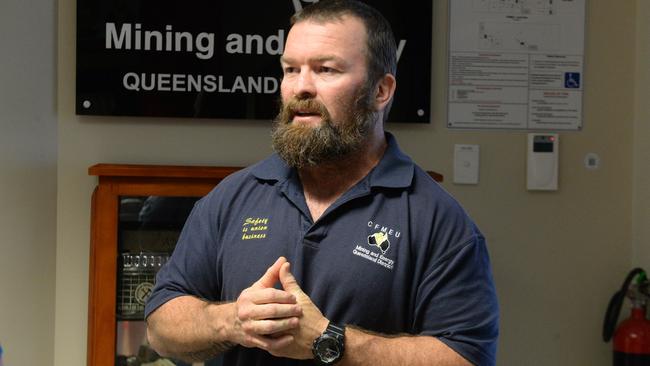McKell and CFMEU blame coal mine labour hire for $700m drain
A Central Queensland mine worker is earning between $40,000 - $50,000 less than some of his workmates doing the same job as a new report reveals ‘millions’ is being drained from mining communities. Find out why.
Business
Don't miss out on the headlines from Business. Followed categories will be added to My News.
Labour hire has drained millions from coal communities across Central Queensland in reduced worker wages, a progressive think tank has claimed as miners on the ground speak up.
Labour hire worker Brodie Allen says he earns between $40,000 and $50,000 less than direct hire employees, or workers employed directly through the mining company.
“Coal prices are booming at the moment but I don’t see any benefit flowing to me through better wages or conditions, it’s really frustrating,” he said.
“My employer (the labour hire firm) always just says that they can’t improve conditions as they will lose their ability to compete for contracts.”
Mr Allen is employed on a permanent basis with paid leave entitlements but wants a direct hire job.

The union-affiliated McKell Institute says mining firms outsourcing to labour hire companies has reduced the amount of economic activity in coal towns from Mackay to Emerald by up to $700m.
“Wage cutting strategies in the mining sector within the federal electorate of Flynn cost the community between $218m and $357.5m in localised economic activity per year,” the report states.
In the seats of Dawson and Capricornia, the drain is pegged at between $223m and $395m.
CFMEU Queensland district president Stephen Smyth says labour hire has destroyed job security in the sector.
“Secure jobs have been an important part of the social compact between mining companies and host communities,” he said.
“But this report shows how mining companies have washed their hands of this responsibility and communities are being ripped off.”
Labour hire is not synonymous with casual work, though on occasion the CFMEU conflates permanent employment and secure work with direct hire arrangements.
Labour hire workers can be employed as full time employees with paid leave entitlements, the traditional definition of a permanent worker, and ABS data shows casuals, or workers without paid leave entitlements, are a minority of Australia’s mining workforce.

In 2021, 88 per cent of mine workers were in permanent positions across the country.
But in the view of the union, employment through a labour hire firm qualifies as insecure work, even if it is a permanent job with paid leave entitlements.
“They (labour hire firms) do offer permanent roles, but you’re still a permanent with a labour hire company,” Mr Smyth said.
“It’s still insecure work, you can be turned off at any time.
“It’s a fallacy to say, ‘oh I’m with the labour hire company and I’ve got permanent work.’
“It’s still insecure work because you’re at the whim of the labour hire company, which is at the whim of the client, like BHP.
“Your employment tenure is based on that labour hire company or contracting company maintaining a contract with the mining companies,” he said.
Mr Smyth also said labour hire permanents did not enjoy the same conditions as direct hire employees.
“I am yet to see a labour hire worker on the same conditions and entitlements as a full time employee where they work at a mine side-by-side,” he said.
The union argues Labor’s Same Job, Same Pay policy could help rectify disparities between labour hire and direct hire employees.
Minerals Council of Australia president Tania Constable says the policy wasn’t necessary because the industry already offered workers impressive salaries and conditions.

“The case for targeting mining with this policy has not been made,” she said.
“Mining is providing highly skilled, highly paid and secure jobs across Australia.”
Ms Constable added a ‘same job same pay’ principle was already enshrined in industry awards and there were legitimate reasons for pay differentials above the award rate.
“Some workers may earn more than their colleagues in the same work team because they have more qualifications, longer experience, a capacity to operate more types of equipment or have greater familiarity with the geology of particular mines,” she said.
“Pay differentials may also reflect changes in labour demand at the time of employment.”
Ms Constable also cited data from the ABS which stated the median weekly earnings of mining employees paid by labour hire firms were about $300 more than the median weekly earnings of direct hire employees.
Mr Smyth said he disputed the ABS figures.
“We dispute those figures, they’re just wrong to be honest.”
Some firms across the Basin are beginning to move away from the use of labour hire, including mining giant Anglo American.
The company is reviewing its employment model at Grosvenor Mine with the findings expected in July.
In June 2021, the CFMEU lodged an official complaint with the Fair Work Commission over One Key employment contracts at Grosvenor.
Specifically, the union claimed the practice of placing workers on fixed-term contracts disguised the permanent nature of their employment.





